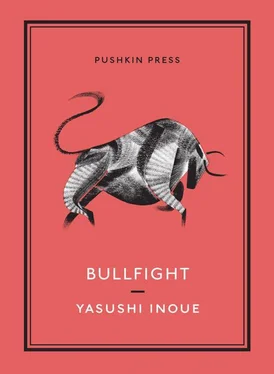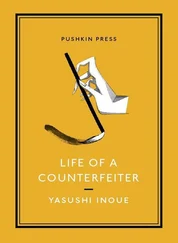Yasushi Inoue - Bullfight
Здесь есть возможность читать онлайн «Yasushi Inoue - Bullfight» весь текст электронной книги совершенно бесплатно (целиком полную версию без сокращений). В некоторых случаях можно слушать аудио, скачать через торрент в формате fb2 и присутствует краткое содержание. Год выпуска: 2013, Издательство: Pushkin Collection, Жанр: Классическая проза, на английском языке. Описание произведения, (предисловие) а так же отзывы посетителей доступны на портале библиотеки ЛибКат.
- Название:Bullfight
- Автор:
- Издательство:Pushkin Collection
- Жанр:
- Год:2013
- ISBN:нет данных
- Рейтинг книги:4 / 5. Голосов: 1
-
Избранное:Добавить в избранное
- Отзывы:
-
Ваша оценка:
- 80
- 1
- 2
- 3
- 4
- 5
Bullfight: краткое содержание, описание и аннотация
Предлагаем к чтению аннотацию, описание, краткое содержание или предисловие (зависит от того, что написал сам автор книги «Bullfight»). Если вы не нашли необходимую информацию о книге — напишите в комментариях, мы постараемся отыскать её.
Bullfight Bullfight
The Hunting Gun
The Counterfeiter
Contains a previously unpublished preface by Inoue himself.
Bullfight — читать онлайн бесплатно полную книгу (весь текст) целиком
Ниже представлен текст книги, разбитый по страницам. Система сохранения места последней прочитанной страницы, позволяет с удобством читать онлайн бесплатно книгу «Bullfight», без необходимости каждый раз заново искать на чём Вы остановились. Поставьте закладку, и сможете в любой момент перейти на страницу, на которой закончили чтение.
Интервал:
Закладка:
“I’m not a superstitious man,” he said, “but I thought sukiyaki might be just the thing, even if it is in somewhat poor taste. Either way, we’re going to get fat off these cows!”
Tashiro was in high spirits, thrilled at how well things had turned out. Soon the sake started going to his head, and he proposed that when the bulls reached Kobe they ought to dress them in really showy aprons, those ceremonial things worn by sumo wrestlers, and parade them along the streets from Kobe to Nishinomiya, and then the next day they could have another parade in Osaka, to kick things off in the grandest possible manner. He rubbed his oily face with his palm, then bent to fill Omoto’s and Tsugami’s cups. At moments like these, Tsugami was struck by the childlike look on Tashiro’s face.
When Tashiro went off to use the restroom, Omoto, who had been as drunkenly giddy as the rest of them, declared in an oddly solemn tone, “The problem is all the money we’ll have to sink into this thing until cash comes in from ticket sales. I did some rough calculations, and it looks to me like we’ll need about a million yen.”
“Yeah, it’ll take that much for sure.”
“So what do we do?”
“Oh, we’ll find it somehow.”
“You think?”
“We’ll link all the publicity to advertising, and I’ll find some way to convince the stadium to wait until after the event for the rental fees. The only worry is, we’ll need two to three hundred thousand yen just to build the ring and the stable.”
“We can’t get three hundred thousand, not all at once!”
“It’ll be all right, just leave it to me.”
Tsugami had no clear plan in mind, but if all else failed they could raise the cash by selling tickets in advance. Right now his thoughts were focused less on financial details than on the parade of bulls that Tashiro had suggested. Twenty or so bulls. It would make an eye-catching article, nice photos. At the very least it was sure to get everyone talking. Somewhere deep in his head, which was throbbing a bit now from the mixture of sake and whiskey, he kept carefully sketching out that marvelous scene, then erasing it; sketching it, and erasing it.
The next day, Tsugami formed a Bullfighting Tournament Preparation Committee. He appointed as its members T., who couldn’t write a newspaper article to save his life but had an extraordinary talent for negotiating; M., who came up with great ideas but couldn’t carry them out; and a few other young men from advertising.
Only two months remained until the date of the tournament. The first announcement would have to appear in the paper at least a month in advance, which meant running it in the middle of December. The arrangements would have to be finished by then. Bargaining with the stadiums could wait; first they needed to get the bulls. And so, just two or three days after Tashiro went back to Shikoku, Tsugami and the young reporter T. made the trip down to W. As it turned out, by the time they arrived Tashiro had already done all the necessary negotiating with the locals and the Association — they had agreed to a bull-rental fee of twenty thousand a head and selected twenty-two glorious bulls for the ring; there was nothing left for Tsugami and T. to do. Naturally the Association and the owners were as enthusiastic as could be, and treated Tsugami and T. with such reverence — almost like two messiahs — that they wondered how Tashiro had talked them up.
The owners were all wealthy locals; it appeared that in this region it was everyone’s dream to be rich enough one day to possess a sumo bull. People who, had they lived anywhere else in the country, would have built themselves a grand storehouse spent their money instead on massive animals bred purely for bullfighting, and they had been doing so for ages.
Tsugami and the others paid a visit to the house of Atomiya Shigesaburō, an old man who served as vice-president of the Association and who was himself the owner of one of the bulls selected for the tournament. Atomiya, who was the most successful farmer in the region, was almost maniacal in his devotion to bullfighting; already in his seventies, he had the robust, hearty air of an aged warrior. Evidently he had inherited his craze for bullfighting from his father, who was such a bull-sumo fiend that, according to the truth-is-better-than-fiction story people told, his last words as he lay on his deathbed had been, “I made my fortune, I built this house, so I have no real regrets. The one regret I have is that my bull always lost to Tamura’s. Avenge me, son.”
Naturally Atomiya, who was still young at the time, devoted himself with all the energy he could muster to training the family bull, in accordance with his father’s dying wish. At the April tournament three years after his father passed away, the story goes, the bull upon which he had lavished so much attention and love finally took down Tamura’s bull, and Atomiya tied his father’s picture to the bull’s back and paraded the animal in its slow, rocking way through the streets of W.
Listening as the old man slowly told his stories on that first night, the haori and hakama he wore giving him an air so formal that he might have been welcoming the prefectural governor to his house, Tsugami felt himself flirting oddly with depression, his gloom strengthened by his exhaustion after the lengthy trip. It wasn’t old man Atomiya who had this effect on him; for some reason, whenever he felt the heat of the bull fever that gripped this region radiating across his face, his heart would sink rather than rise to match the excitement around him. Each morning as he sat on the verandah at the inn, facing the undulating azure sea, its color vivid and intense in the way it only ever is in the south, he would stare out over the water, struggling not to give in to some feeling he could not define.
Tashiro was busy the whole time Tsugami and T. were in town. He took the two visitors to see the shrine where the bull-sumo tournament was held each January, showed them the major bull stables scattered throughout W. and its environs, and then on the way back made a detour to lead them past a house where he said his brother lived, which was ringed by a stone wall — a rarity in the countryside. Everywhere they went he wore his heavy leather overcoat and rushed about in a hurry, the tip of his nose glistening with sweat. Almost every night there was a party, which he would inaugurate by saying a few words, calling Tsugami and the reporter T. “Sensei” and sometimes referring to the New Evening Post as “our company,” as though he himself were an employee.
As soon as Tsugami returned to Osaka, he got started on the next stage of activities. Everything had gone smoothly in W., but here he met with one unexpected hitch after the next. First there was the all-important matter of booking a venue. Only one of the two stadiums in the area, Hanshin Stadium, would be available around the time they needed it, and after they had already concluded negotiations for use of the building during a three-day period starting January 20, just as they were on the verge of signing the contract, the other side started making difficulties. According to Naniwa Railway, which owned the stadium, the place had long had a reputation for being harder to play baseball in than the other stadium, which was owned by a rival railway company. After the war they had done everything possible to upgrade the field, hoping to wipe away once and for all this negative image, and they were damned if they were going to let anyone come in and hammer stakes into it now, and erect some big round bamboo fence, and have bulls kicking holes in it with their dirty hooves. They were right to object. After any number of determined exchanges, the two sides finally reached a tentative agreement that would enable the paper to rent the stadium, but no sooner had they heaved a sigh of relief at that than the pro baseball team that played in the stadium started grousing because they wouldn’t be able to play during that period. The paper barely managed to mollify the players by asking two or three big-boss types to intervene, but it took a shocking sum of money to make it happen. And then the prefectural Safety Division refused to grant permission for the event. The reason they gave was that the form of entertainment known as “bullfighting” had no history in Japan, so there was no protocol for dealing with it. The paper telegrammed Tashiro to come up right away from Shikoku, only to learn that even in Ehime Prefecture, the original birthplace of bull sumo, permission had never once been granted to present the sport as an entertainment. Omoto went to talk to the authorities, Tsugami went to talk to the authorities, but even after endless wrangling back and forth the authorities still refused to budge. Meanwhile Tashiro, who had made the trip between Shikoku and Osaka three times, began building support in Ehime by asking prominent local figures for help. After all this had failed, the reporter T., with his genius for negotiating, took over. He paid a few visits to the Prefectural Office, provided a signed statement explaining that in the event of an accident they would immediately cancel the entire tournament, and came back having persuaded the chief of the Safety Division to approve the bullfight. That had been just two or three days ago. And now here it was — the draft for the notice announcing the tournament, which Tsugami had almost given up on ever seeing in print, laid out by a young man in the copyediting department, right there on the front page: two bulls ramming their heads together, cut out of a photograph, inserted into a large box right between the day’s two lead stories, one about a teacher’s strike and another about infighting in the Socialist Party, where it would catch anyone’s eye. To Omoto and Tsugami both, the ad was like a hunting dog that had broken free from their grasp.
Читать дальшеИнтервал:
Закладка:
Похожие книги на «Bullfight»
Представляем Вашему вниманию похожие книги на «Bullfight» списком для выбора. Мы отобрали схожую по названию и смыслу литературу в надежде предоставить читателям больше вариантов отыскать новые, интересные, ещё непрочитанные произведения.
Обсуждение, отзывы о книге «Bullfight» и просто собственные мнения читателей. Оставьте ваши комментарии, напишите, что Вы думаете о произведении, его смысле или главных героях. Укажите что конкретно понравилось, а что нет, и почему Вы так считаете.












